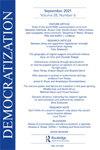How do voters respond to party switching in Africa?
IF 2.9
1区 社会学
Q1 POLITICAL SCIENCE
引用次数: 0
Abstract
ABSTRACT Are there electoral consequences for elected politicians who switch from one party to another? Existing research on this question discovered that switchers often perform worse in elections than non-switchers because voters are suspicious of their intentions, especially in older democracies. Nonetheless, few robust studies have been conducted on this in Africa amidst concerns of weak party institutionalization and voters’ passivism, despite the prevalence of switching on the continent and copious existing research on the issue on other continents. I conducted a nationwide representative survey gauging voters’ response to party switching and analysed an original dataset on party switching among African MPs, using Nigeria with over 200 cases of party defection within eight years as a case study. I discovered party switchers in Nigeria, Africa's biggest democracy, performed worse in elections compared to non-switchers, with significant implications for our understanding of voting behaviour in Africa.选民对非洲政党的转变有何反应?
摘要:对于从一个政党转向另一个政党的民选政客来说,这会对选举产生影响吗?现有的关于这个问题的研究发现,转换者在选举中的表现往往比非转换者差,因为选民对他们的意图持怀疑态度,尤其是在旧的民主国家。尽管如此,尽管非洲大陆普遍存在换届现象,其他大陆也对这一问题进行了大量的现有研究,但由于担心政党制度化不力和选民的被动主义,非洲很少对此进行有力的研究。我进行了一项全国性的代表性调查,衡量选民对政党转换的反应,并分析了非洲议员政党转换的原始数据集,以尼日利亚为例,在八年内发生了200多起政党叛逃案件。我发现,在非洲最大的民主国家尼日利亚,政党转换者在选举中的表现比非政党转换者差,这对我们理解非洲的投票行为有重大影响。
本文章由计算机程序翻译,如有差异,请以英文原文为准。
求助全文
约1分钟内获得全文
求助全文
来源期刊

Democratization
POLITICAL SCIENCE-
CiteScore
6.40
自引率
12.50%
发文量
73
期刊介绍:
Democratization aims to promote a better understanding of democratization - defined as the way democratic norms, institutions and practices evolve and are disseminated both within and across national and cultural boundaries. While the focus is on democratization viewed as a process, the journal also builds on the enduring interest in democracy itself and its analysis. The emphasis is contemporary and the approach comparative, with the publication of scholarly contributions about those areas where democratization is currently attracting considerable attention world-wide.
 求助内容:
求助内容: 应助结果提醒方式:
应助结果提醒方式:


